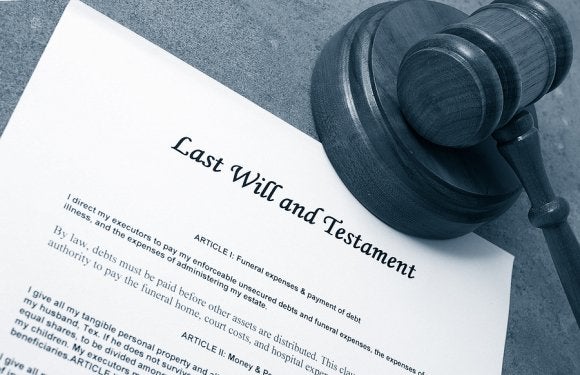-
Instances When Probate Litigation May Be Required
After a death, matters pertaining to the decedent’s debts and assets are resolved through the probate process. In many cases, probate is straightforward and is easily settled. However, sometimes probate litigation may be necessary to resolve claims. It’s always a good idea to retain the services of a lawyer when dealing with probate court in Conroe, TX. A probate lawyer can help you in the event that probate litigation is needed, such as if you believe it necessary to authenticate a will. Your lawyer might contest a will if you believe that the document was not drafted properly or the signature may not be valid.
It’s not uncommon for the terms of a decedent’s will to become a source of disagreement among the heirs. You’ll need the services of a skilled probate attorney in the event that you need to dispute the will or if another heir has disputed the will. Another reason why probate litigation may be necessary is if a loved one dies intestate (without a last will and testament). In these cases, an attorney can facilitate the process of determining the rightful heirs.

-
Tips for Discussing Your Will with Your Family
Many people hesitate to discuss estate planning because the subject is inevitably tied to death. Although estate planning may be an uncomfortable topic of discussion, it is quite often a necessary one. You may prefer to wait to discuss these matters with your family until after you have met with a lawyer and drafted your will. If you feel that a discussion about estate planning will turn into a contentious argument among family members, you could even request that your lawyer be present to serve as a neutral third party and answer legal questions.

Determine Your Priorities
Before you meet with the will attorney, write a list of your priorities. Remember that the assets you leave behind should ideally serve to accomplish your goals, rather than to reward deserving loved ones. For example, you might prioritize the care of an ill or disabled family member, the support of a favorite charity, or the education of grandchildren. Determining your priorities will help you when drafting the will and when discussing it with your family members.Decide How Much Information You Wish to Disclose
Ahead of the discussion, determine how much information you’re comfortable sharing with your family. Some people prefer to say very little, informing their heirs only that they’ve drafted a will and that they believe that the will allows for a fair and equal distribution of wealth. Other individuals feel that providing detailed information about which heir will receive which asset will prevent future arguments.Explaining Unequal Distributions
If your will is going to distribute more assets to one heir than to another, you may wish to explain your reasoning. For example, you may have two children, one of whom is a geologist with a lucrative salary and the other is a childcare worker with only a modest wage. You may prefer to leave more than half of your wealth to the latter child. If so, you could explain to your children that this does not reflect favoritism, but rather addresses a real financial need.Consider Disclosing Information After Your Passing
If you feel uncomfortable explaining the terms of your will to your family, you could write separate letters to your heirs or one letter addressed to all of them. Yes, even the videotaped lecture is not uncommon. These procedures allow you to explain your reasoning in a manner which is separate from the will. Keep sealed letters of explanation with the will. -
What to Expect During an Evidentiary Hearing in Your Child Custody Case
When you hire a child custody attorney near Spring, TX, he or she will advise you of what to expect from all stages of the legal process. If you and the other parent cannot come to an agreement regarding child custody , then you may need to attend an evidentiary hearing. During this hearing, your family law attorney will represent you. Nevertheless, you and the other parent will have to testify under oath. While you are under oath, the other parent’s family law attorney will ask you questions, which you are required by law to answer truthfully. Just remember, in a court proceeding, if you do not remember something or do not know the answer to a question, you should say so.
To hear more about the role of the evidentiary hearing in family law, watch this video and consult your child custody lawyer. This expert discusses which other individuals may be questioned under oath at the hearing, such as a minor child. Additionally, certain experts may be called to testify.
-
Probate in Texas: Understanding the Process
Probate is the process of recognizing a death and validating a will for the purpose of administering the decedent’s estate. A decedent’s estate will go through probate regardless of whether an individual had a legal will or died intestate (without a will). After a loved one passes, hiring a probate lawyer can be immensely helpful. A probate attorney in The Woodlands can ensure that the requirements of the Texas Probate Code are met and that probate proceeds as efficiently as possible. The lawyer can also help the family understand what to expect from each step of the probate process.

Waiting Period
The first step your lawyer will take in most probate cases is to file the application and the original of the will at the courthouse. Then, there is a mandatory waiting period, which begins once the application is filed.Probate Hearing
After the waiting period, the court may schedule a probate hearing or your attorney may schedule it. Probate hearings are usually held in the courtroom, however, sometimes they take place in the judge’s office. At the probate hearing, the judge will recognize the death of the decedent, determine that the court has jurisdiction, determine that the executor is qualified, and recognize the validity of the will . The lawyer states certain facts about the decedent to a witness, who is then required to confirm the truth of the facts. Thereafter, the judge may issue an order that admits the will to probate.Estate Administration
After the probate hearing, the executor begins administering the estate. He or she must sign an Oath, which is a legal document verifying the executor’s intent to fulfill all necessary duties required by law and the will. Next, the executor usually orders Letters Testamentary. These “Letters” provide the executor with the authority necessary to administer the estate, such as the power to close bank accounts and sell property. The executor must also publicize information about the estate to potential creditors, provide each beneficiary with a copy of the will, and file various documents with the court. These documents typically include an inventory of probate assets, the decedent’s final income tax return, and a document that confirms the publication of notice to the creditors. Finally, the executor will resolve debts and distribute assets. -
Do You Need to Set Up a Trust?
If you wish to make financial arrangements for your children, grandchildren, or other heirs, it’s a good idea to speak with a lawyer about estate planning , including the possibility of establishing a trust. An attorney in Conroe, TX, can help you explore the various aspects of a trust and how to structure your trust to accomplish your goals. For example, you could use the trust to leave a certain amount of money to your child, which could be distributed in set amounts at certain intervals. This arrangement prevents your child from spending his or her inheritance all at once. Or, you can place conditions on your child’s inheritance. For example, you can have your lawyer set up the trust to distribute small amounts of money over time and to only allow your child to receive the rest after he or she graduates from college.
Another reason why you might ask your attorney to establish a trust is for tax advantages. Life insurance policies provide tax-free benefits to your beneficiaries. However, the death benefit amount may be added back into the estate, which may make it [the estate] subject to federal estate taxes. Establishing an irrevocable life insurance trust protects the full death benefit for your beneficiaries.

RECENT POSTS
categories
- Uncategorized
- Estate Planning
- Probate
- Family Law
- Drafting a Will
- Divorce Lawyer
- Texas Family Law
- Divorce
- Real Estate
- Probate Court
- Child Custody
- Andrew J. Bolton
- Esq.
- Adoption
- Law Office of Andrew J. Bolton
- Wills
- Executor
- Infographic
- Guardianship
- Trusts
- Contested Divorce
- Child Support
- Attorney
- Living Wills
- Contested Will
- Prenuptial
- Probate Bond
- Heir Apparent
- Legacy Contact
- Living Trusts
- legal guardian
- Legal Disputes
- property rules
- Common Law
- Stocks
- Estate Tax
